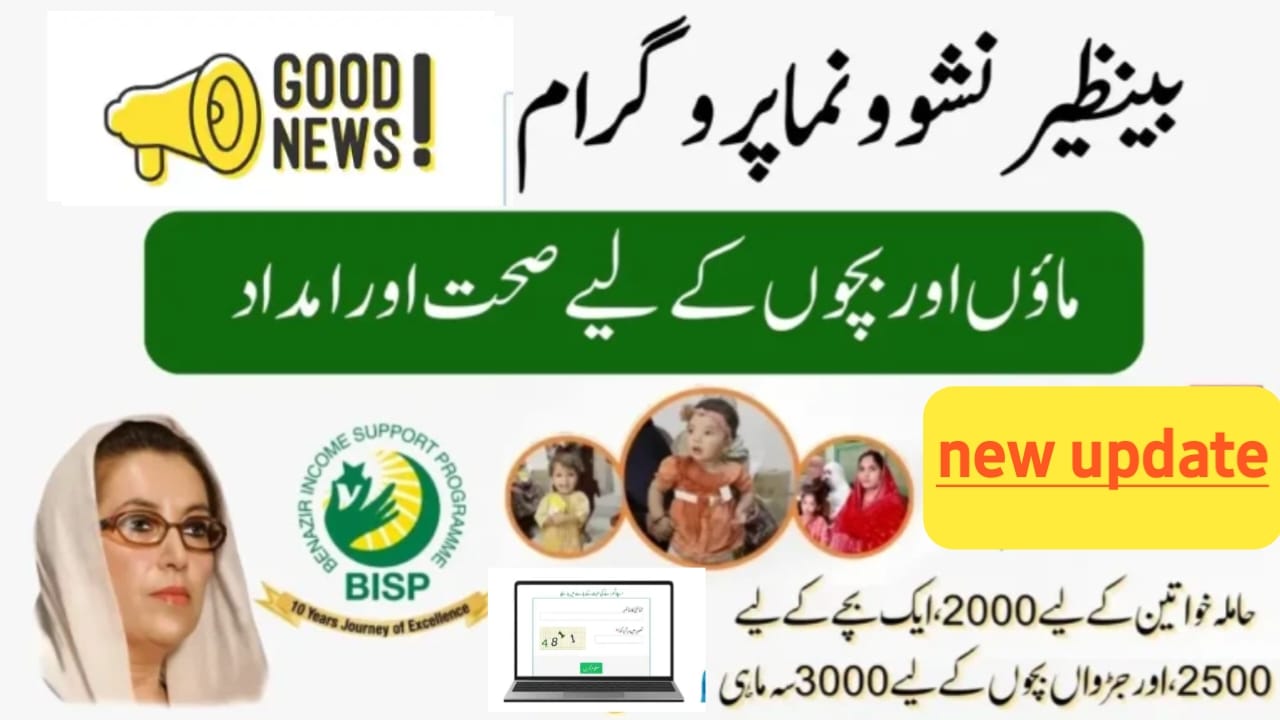In Pakistan, malnutrition and poor maternal health have remained persistent issues, especially among low-income families. Recognizing the critical need to address these challenges, the government launched the Benazir Nashonuma Program under the broader Benazir Income Support Program (BISP). This initiative aims to combat child malnutrition, improve maternal health, and provide financial assistance to vulnerable women and children across the country.
Purpose and Vision
The Beanzir Nashonuma Program was launched with a clear goal: to reduce stunting and malnutrition among children under the age of two while ensuring that pregnant and breastfeeding women receive the necessary support for a healthy pregnancy and postnatal care. The program aligns with the government’s broader objective of building a healthier and more resilient population through social protection and targeted nutritional support.
Who Is Eligible?
The program is designed specifically for:
- Pregnant women
- Lactating mothers
- Children below two years of age
These individuals must be registered under BISP’s Kafalat program, which verifies their financial need and socio-economic status.
Financial Assistance and Incentives
One of the most impactful features of the program is the monthly conditional cash transfer provided to beneficiaries:
- PKR 2,000 per month for each boy child
- PKR 2,500 per month for each girl child
This gender-sensitive approach encourages families to prioritize the health and nutrition of girls, who are often more vulnerable to neglect in traditional households.
Health and Nutrition Services
In addition to financial support, the program offers a comprehensive package of health and nutrition services:
- Regular medical checkups for pregnant women and children.
- Nutrition counseling to help mothers make informed dietary choices.
- Supplementary nutrition packages that provide essential vitamins and minerals.
- Immunization support to ensure children receive all required vaccines on time.
- Health education sessions focused on topics such as breastfeeding, hygiene, and family planning.
These services are provided through Nashonuma Centers, which are established in government hospitals or Basic Health Units (BHUs) across selected districts.
Why the Program Matters
According to UNICEF and other global health organizations, nearly 40% of children under five in Pakistan suffer from stunted growth due to malnutrition. This has long-term consequences on physical development, cognitive ability, and overall health. The Benazir Nashonuma Program addresses this issue at the root by supporting both mother and child during the first 1,000 days of life—a crucial period for physical and mental development.
Additionally, many mothers in low-income families lack access to even the most basic healthcare services. By providing both financial assistance and access to free health services, the program empowers women to take charge of their health and their children’s future.
Enrollment and Registration Process
To benefit from the program, eligible women must:
- Be registered with the BISP Kafalat program.
- Visit a designated Nashonuma Center or BISP Tehsil Office.
- Bring the following documents:
- Original CNIC
- B-form of the child (if already born)
- Proof of pregnancy or medical records
Once enrolled, beneficiaries must attend scheduled health sessions and medical checkups to continue receiving monthly payments.
Impact and Expansion
Since its launch, the program has been rolled out in multiple districts across Pakistan, with plans to expand further. Thousands of mothers and children have already benefited from improved nutrition, access to healthcare, and financial relief. The government, with the support of international organizations such as the World Food Programme (WFP), continues to monitor and improve the program to reach more families in need.
A Step Toward a Healthier Pakistan
The Benazir Nashonuma Program is more than just a welfare initiative—it is a step toward building a healthier, more equitable society. By investing in the health of mothers and their young children, the program lays the foundation for a stronger, more productive future generation.
In a country where poverty and health challenges go hand in hand, such targeted programs are vital for breaking the cycle of intergenerational malnutrition and inequality. The Benazir Nashonuma Program stands out as a model of compassion, empowerment, and sustainable development.
For More Information Click Here
